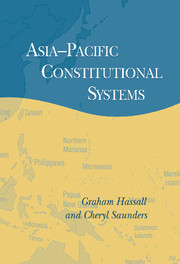Book contents
- Frontmatter
- Contents
- Acknowledgements
- Map: The Asia-Pacific Region
- Introduction
- Part I Modernity and Nation-States at the Dawn of the Global Era
- Part II The Constitution of Modernity
- Part III Democracy and the Rule of Law
- Conclusion: Postmodernity and constitutionalism
- Appendix: Chronology of constitutional events in the Asia Pacific
- Bibliography
- Index
Introduction
Published online by Cambridge University Press: 09 October 2009
- Frontmatter
- Contents
- Acknowledgements
- Map: The Asia-Pacific Region
- Introduction
- Part I Modernity and Nation-States at the Dawn of the Global Era
- Part II The Constitution of Modernity
- Part III Democracy and the Rule of Law
- Conclusion: Postmodernity and constitutionalism
- Appendix: Chronology of constitutional events in the Asia Pacific
- Bibliography
- Index
Summary
Among the immense challenges facing states at the beginning of this new century is that of establishing a global order in which the legitimate rights of peoples and nations are balanced with the inevitable adjustments required by globalisation. The Declaration of Human Rights, adopted and acclaimed by the General Assembly of the United Nations on 10 December 1948, must surely have had more impact on thinking about law, constitutionalism and governance than any other document produced in the last century. In the twentieth century, government was based on the philosophical presuppositions of modernity: sovereignty resided in the people, and the legitimacy of states rested on adherence to the rule of law, the holding of periodic elections, and the maintenance of democratic values that maximised the freedom of the individual. While these presuppositions continue to inform the thinking of many occupants of public office, new ideas about governance are emerging from reflection on the successes and failures of tatecraft in the last century.
This book provides an opportunity to reflect on the constitutional experience of the states of Asia and the Pacific during this period of transition. It consults history so as to face the future. It focuses on a unique sub-region of the world system, one with immense diversity in cultural, religious, political and social–economic traditions. Curiously, however, the constitutional arrangements of Southeast Asia and the Pacific Island countries have received relatively little attention in Western literature.
- Type
- Chapter
- Information
- Asia-Pacific Constitutional Systems , pp. 1 - 10Publisher: Cambridge University PressPrint publication year: 2002

